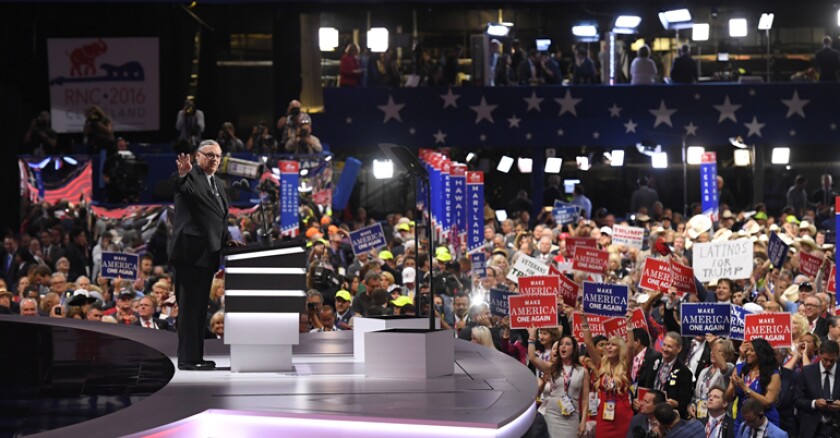Despite Donald Trump's resonant call for "law and order," several prosecutors and law enforcement officials who were castigated for harsh criminal justice policies were defeated.
Joe Arpaio, the longtime sheriff of Maricopa County, Ariz. -- and a prominent Trump supporter -- was defeated by Paul Penzone, a retired police sergeant. Arpaio, first elected in 1992, was well-known nationally for his tough-on-immigrants stance but recently faced a federal contempt charge over racial profiling. Meanwhile, Maricopa County Attorney Bill Montgomery is ahead in his race, but there are a number of absentee ballots yet to count.
Montgomery was one of three prosecutors targeted by wealthy liberal donor George Soros for defeat. The other two were defeated. Republican incumbent Mark Ober of Hillsborough, County, Fla., which includes Tampa, was beaten by Democratic Andrew Warren, a former federal prosecutor. Devon Anderson, the Republican incumbent in Harris County, Texas, which includes Houston, lost to Democrat Kim Ogg, a former felony prosecutor. Warren and Ogg both pledged to embrace criminal justice reform, promising to show less prosecutorial zeal than their rivals on matters ranging from marijuana busts to seeking the death penalty.
In Colorado, Beth McCann, a Democratic state representative who won the district attorney's race, vowed to address disproportionate incarceration affecting racial minorities.
These shifts among prosecutors follow similar outcomes this year in primaries in Chicago, Cleveland, Orlando and Jacksonville, where incumbents were ousted due in large part to opposition from the Black Lives Movement and other racial justice groups.
Voters Approve Big Bond Measures
Voters approved scores of local measures around the country, including billions of dollars worth of bonds.Voters in three Bay Area counties approved a $3.5 billion bond measure for BART, the San Francisco area's subway system, overcoming a two-thirds vote requirement.
A transportation sales tax in Los Angeles, which will raise $860 million a year, was running just ahead of the two-thirds threshold required as of press time. Voters in L.A. also approved a property tax hike to pay for $1.2 billion worth of bonds. The money will be used to build 10,000 units of affordable housing, as well as supportive housing for the homeless.
Similarly, a $258 million housing bond won approval from voters in Portland, Ore. The measure will increase property taxes in order to build an estimated 1,300 units of affordable housing units, meant to alleviate the strain on low-income residents of one of the nation's hottest real estate markets.
Soda Taxes Win
The policy fight that drew the most attention involved sodas.Soda tax measures passed in four cities. The local measures saw a total of more than $50 million in spending, with soda makers hoping to stave off what they see as a threat to their product sales. Former New York Mayor Michael Bloomberg was among the big donors in favor of the taxes.
Voters in San Francisco, Oakland and Albany, Calif., approved measures to impose a penny-per-ounce tax on sugary drinks. Boulder, Colo., voters approved a measure calling for a 2-cent-per-ounce tax.
Those cities now join Philadelphia and Berkeley, Calif., where voters approved soda taxes in previous years.
On Tuesday, Berkeley voters approved a measure allowing the city council to grant the right to vote to 16 and 17 year olds in school board elections. Two Maryland municipalities already allow minors under the age of 18 to vote in local elections. San Francisco voters, however, rejected a similar measure.
Meet the New Mayors
Two big-city mayors survived serious reelection challenges on Tuesday. Carlos Giminez won another term as Miami-Dade County mayor, beating back Raquel Regalado, a school board member. In Honolulu, Mayor Kirk Caldwell prevailed in a runoff against former U.S. Rep. Charles Djou.There was no surprise in the mayoral elections in Baltimore and Wilmington, Del. After winning their respective Democratic primaries, Maryland state Sen. Catherine Pugh and Delaware developer Mike Purzycki were considered shoo-ins.
In Fresno, Calif., City Council member Lee Brand appears to have defeated County Supervisor Henry Perea in the mayor's race, but there are still a number of absentee and provisional ballots to count.
In Richmond, Va., early returns showed former Commonwealth Secretary Levar Stoney winning a majority of the city's council districts, which is necessary to avoid a runoff. If a runoff occurs, it will not include Joe Morrissey. Morrissey was the initial frontrunner, despite having spent time in jail last year on sex offense charges, after pleading guilty to the delinquency of a minor.
There will be a runoff in Baton Rouge, La., where Mayor Kip Holden opted not to seek a second term. The city was rocked this past summer by killings involving peace officers, both as shooters and victims, as well as severe flooding.
Democrat Sharon Weston Broome, a former state senator, finished just ahead of Republican state Sen. Bodi White, atop a large field. The two will proceed to a runoff election on Dec. 10.
Vincent Gray, a former mayor of Washington, scored a partial comeback on Tuesday, winning a seat on the City Council two years after being unseated by Mayor Muriel Bowser. Bowser had a tough night, with most of the candidates she supported for council seats losing.









